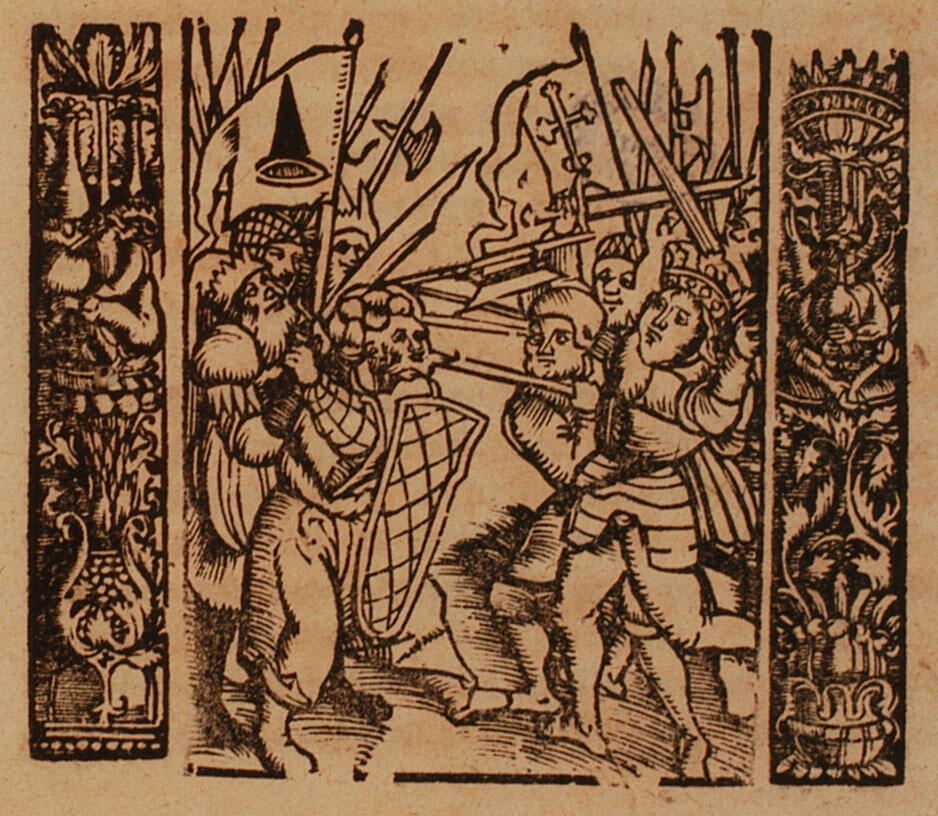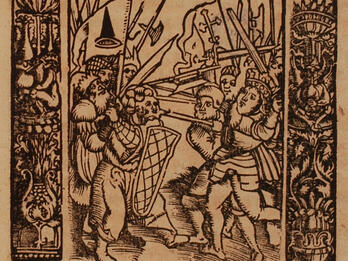Purim Scroll
May this be written for a coming generation, that people yet to be created will praise Jah. For the signs and wonders that the most high God has performed for us, I am pleased to relate:
Know that in the year 5298 [1538] a mighty war took place between the kingdom of Venice and Suleiman, king of Turkey. In those days they sent from Venice to Candia the distinguished minister Messer Juan Muro the lion-hearted and appointed him as general Provisor over the war, and under his command hired soldiers called soldati to strengthen the fortifications of the city and to rebuild its walls. In those days, there was great commotion and confusion among all the inhabitants of the land. Every day, the non-Jews would go out to build walls and work on the fortifications, to dig trenches, transport stones, construct towers and bastions, as well as to tear down old structures to salvage walls and stones from them for the needs of the war, all at the bidding of the Provisor. He also set the Jews on their watches, a day’s journey this way and a day’s journey that way, some here, some there.
The Watcher of Israel does not slumber nor sleep. The Lord gave the people favor in the eyes of the Provisor and in the eyes of the Venetian senator and nobleman Duke Messer Antonio di Molo, as well as in the eyes of the upright Messer Marco Antonio Trevesino, assistant [to the Provisor] and his advisors. They would show compassion to us and lightened our load. Meanwhile, the popular masses and adversaries of the Jews surrounded them left and right and were envious of the poor Jews. They looked on us as spies and spread rumors of things we had never imagined or dreamed of—in short, they slandered the Jews. But the rulers in their wisdom paid no heed to their words. [ . . . ]
It came to pass on the 17th of Tammuz, which was on a Sunday, we heard a great outcry, and before there was light enough to recognize one’s fellow, a proclamation was announced from the Provisor, that the Jewish men, young and old, should go out to dig in the trenches. When [I,] Elijah heard this, he hid his face in his cloak. I was pained at the desecration of the fast day. I ran to the Provisor and pleaded with him to postpone the order to the next day, but he would not hear me. The taskmasters urged the people, saying, “Complete your work, for the armaments of the Turks are bearing down on our walls.” Although breaking the fast would be easier [to justify] than a question of egg in milk sauce, and if this had been the major and venerable fast of Yom Kippur, I would have not considered it, still, I did not want to bear the responsibility alone, and so I called a communal meeting in the great synagogue. Representatives of the people gathered and agreed that all the working men should violate the fast and postpone it to another day. We thought it a misfortune, but God thought it for our benefit, to provide the remedy before the disease. Thereupon all the Jewish men arose and left the Jewish quarter, leaving there only the aged, the women, and the children.
I left the work site to seek bread, and in the marketplace I heard a great commotion, for the rumor was spreading that spies had come into the city; some pursued them but did not find them. Whereupon one of the adversaries of the Jews said, “I saw men in Turkish dress coming in and hiding in the Jewish quarter.” When others heard this, they went into a rage and said, “Did you see that the Jews are conspiring with the Turks? This is what we were saying for the past several days! The Jews are plotting against us; why be quiet? We have caught them red-handed.” A vast mob gathered, including all the men of the city and the surrounding fields and many from the villages, all with swords and in a frenzy, running into the Jewish quarter. They shouted, “Bring out the men, for they are spies; if you don’t, it will be your lives for theirs,” and so forth. They had their eyes set on the Jews’ money, on their sons and daughters. There was no fear of God or holy intention in all their devisings. They said, “Let us wipe them out and their memory will be no more.”
As I was in the marketplace seeking bread to bring to the poor Jews doing the work, the mob saw me. They rushed to me like bears and said to me, “You are the Doctor of the Jews! Come with us and tell them to bring them out to us.” I conceived my plan and said to them, “As you wish. I will do as you ask of me. Don’t worry.” They took me with them in joy, and as I started to enter the quarter, I raised my voice and said, “Whoever has seen the spies and not notified me, his property will be confiscated.” I approached the women and whispered to them, “Call out loudly and cry with all your might, but let them search; withhold nothing from them.” The women went out in the entrances of their houses, beating their breasts and with tears on their cheeks, crying and wailing before the intruders, “Spill no innocent blood! Don’t touch us because we saw nothing and know nothing!” There was a great outcry in the Jewish quarter of Candia, the like of which was never seen, fulfilling the prophecy, The women bewailing the Tammuz (Ezekiel 8:14).
The gentile mob came swift as eagles into our houses and bedrooms and kitchens. There was not a place they did not examine, no trunk that they did not open, searching in all corners, climbing in through windows and grabbing and trampling some of the residents, with no one to stop them. [ . . . ] I said, “This evil has come from God. What can I still hope?” The word was still in my mouth when God arranged for a friendly gentile to come to me. I sent him to deliver a message to the Provisor: “Save us, my lord, for the waters have come up to the throat! If you do not come quickly, know that we will all be dead, and it will be your people’s fault!” The Provisor was supervising the Jewish workers. When the messenger came, he made haste and rode on horseback, taking with him his mighty men and hired soldiers, and he came to the Jewish quarter. The poor Jews who were doing the work, on hearing the bitter news, [ . . . ] said, “If we go to the city, the calamity is there. If we stay here, the mob will come and attack us and wipe us out!” They fled for their lives in all directions, in caves and tunnels and hideaways. From there, they cried their hearts out to the Lord, each for his house and his children, and their outcry arose before God from their travail, literally and figuratively.
When the Provisor came into the Jewish quarter, the messenger made haste to tell me, and I went to greet him outside the quarter, at the gate to the quarter facing the sea, for I said, let not the entire community perish in a single day. The Provisor came and approached the quarter. When he saw the large mob, he was astonished and flustered. He started speaking gently to them, saying, “Please, my brethren, do no evil! Do not do this disgraceful thing. Don’t speak so arrogantly! Allow me to embrace your cause, and I will obliterate the thorns from your midst.” He strained his throat talking to them, but no one listened or heard his words. When he saw his words had no effect, he changed tactics and commanded his Lombards to draw their swords and attack the ringleaders of the crowd. This struck fear in them, and they started slowly to disperse. They brought forward some of the women and old people whom they had captured, and we redeemed them. Some of them had been abused and accused of being spies and had even been imprisoned. Though weeping prevailed in the evening, there was joy in the morning. The next day he freed them from their imprisonment, and they returned to their houses in peace.
In the end, this was the work of divine providence, that the Jews all left the quarter that day to work on the trenches. For had they not gone out—especially the strong youths—they would not have suffered the mob’s insults, and they would have drawn their swords, leading to much bloodshed, and the whole community might have been annihilated. But when the mob entered the quarter and saw no men to oppose them, while the women, children, and aged pleaded with them and spoke softly to them, their anger quieted. In any case, the Provisor came and extinguished the flame of fury. Our community broke out in joy, and there was great salvation that day and praise to the Lord. [ . . . ]
Whereupon the congregation instituted a minor custom that the 18th of Tammuz should be a day of partying and rejoicing, when fasting is forbidden. Their children who come after them are obligated to follow the custom of their ancestors, in fulfillment of, Hear, my son, the instruction of your father (Proverbs 1:8).
Credits
Published in: The Posen Library of Jewish Culture and Civilization, vol. 5.





